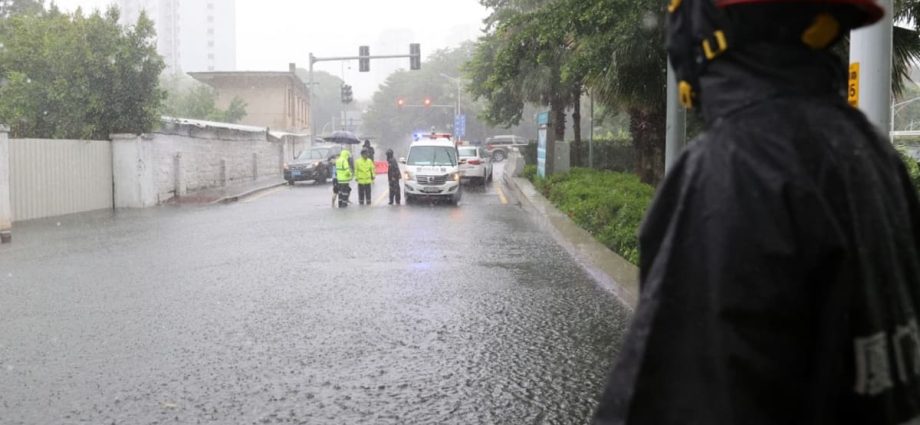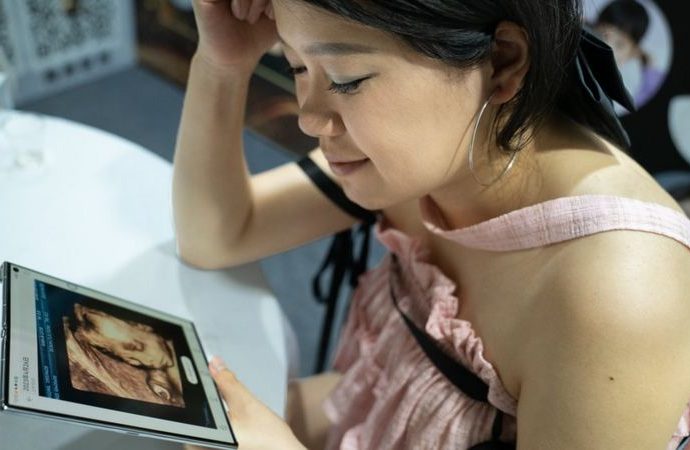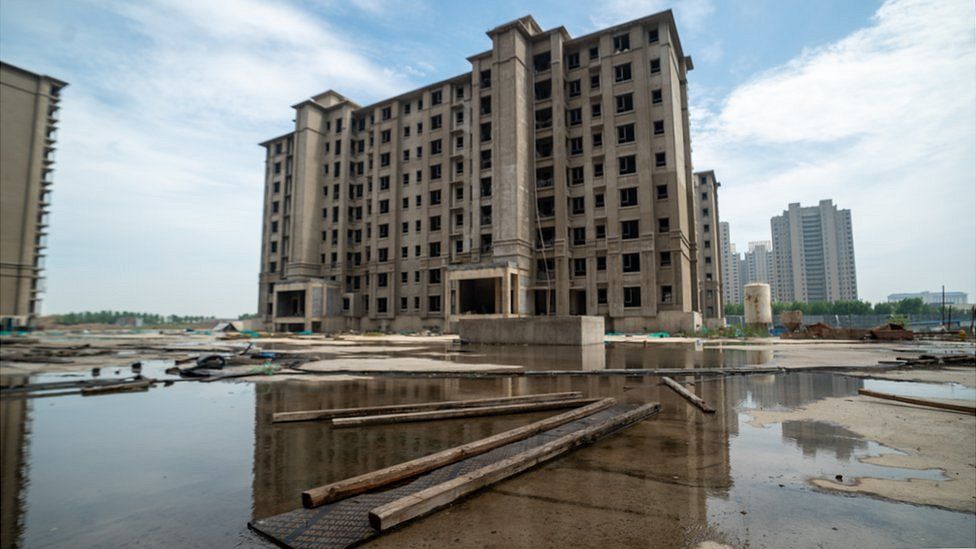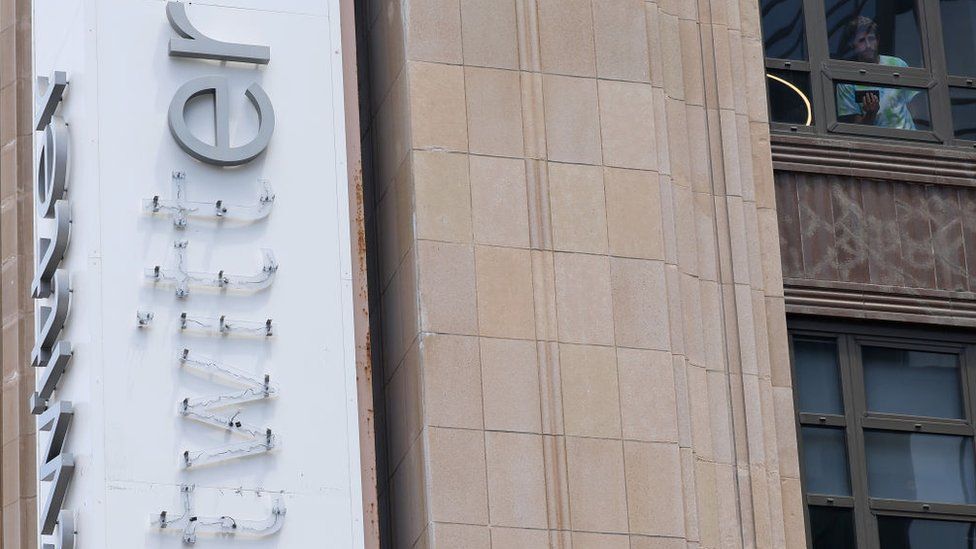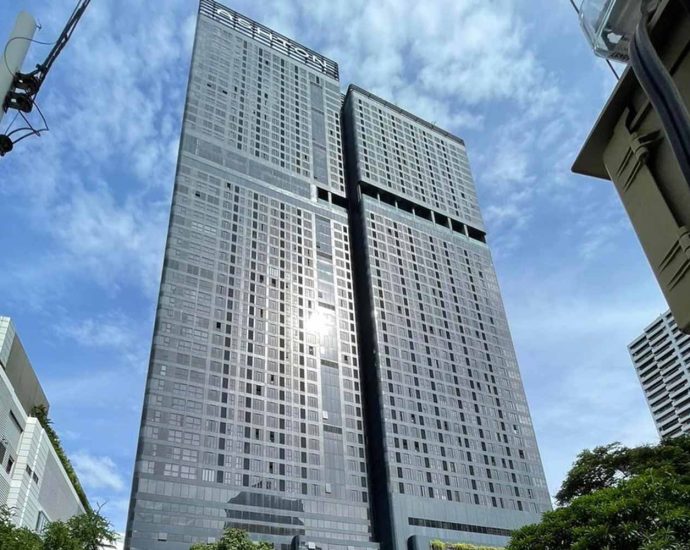China issues red alert for torrential rain in Beijing
The red alert will be in force from 8pm local time (1200 GMT), and covers an area of several hundred million inhabitants, including the metropolis of Tianjin, and the provinces of Hebei and Shandong. Several of Beijing’s parks, lakes and riverside roads have been closed out of precaution, the municipalContinue Reading
Why it’s getting easier to be a single mum in China

Until last year it was not really possible for most unmarried women to become mothers in China – practically speaking. But a social change is under way and it is driving shifts in policy too.
In her flat on the outskirts of Shanghai, Zhang Meili rocks her baby back and forth. As he gurgles away happily, she tells him that she’s going to head out soon to earn money for him.
After his mother goes to work, two-month-old Heng Heng will be looked after by his grandmother – who recently moved to China’s largest city to help her daughter raise her child.
That there is no father in Heng Heng’s life would be frowned upon by many in China, especially in more conservative rural and regional areas. The belief that a child should not be brought into this world without a mother and a father is still widely held here.
In Zhang Meili’s case, she says she was lucky to have moved to Shanghai to run a business because being a single mother in this mega-city is much more accepted.
“I’m grateful for the tolerance of Shanghai,” she says. “I’m from rural Henan, an area which would have a lot of discrimination against me as a single mother.”

She became a single mum after her boyfriend’s family rejected his choice of bride. They considered her position in society to be too modest.
So he broke up with her – even though she was pregnant with his child.
I ask her mother, Mrs Zhao, how she felt when she heard the news that her daughter, who is 25, would keep the baby.
“My feelings? I was heartbroken,” she says. “It’s very hard to raise a kid on your own. And, in our hometown, there would be criticism from neighbours.”
Have her feelings changed now that she’s a grandmother?
“Now I see him, I’m really happy,” she says with a huge smile on her face.
Zhang Meili has options that many unmarried women don’t have because she runs her own small business.
This gives her more independence and control over her life.
Though the little massage shop she runs is still struggling post-Covid, she doesn’t need to clear leave with an employer or battle for social acceptance in a workplace because she has given birth to a son who will be raised without his dad.
Of course, it has not been easy for Zhang Meili to keep her business afloat during such a rocky time economically, with the added challenges of giving birth, plus knowing that – while attitudes are changing – there are still those who will look down on her.
She says that none of her friends backed her decision to keep her child. They thought it would harm her chances of eventually finding a husband, and that it wasn’t right for the child to grow up without a father.
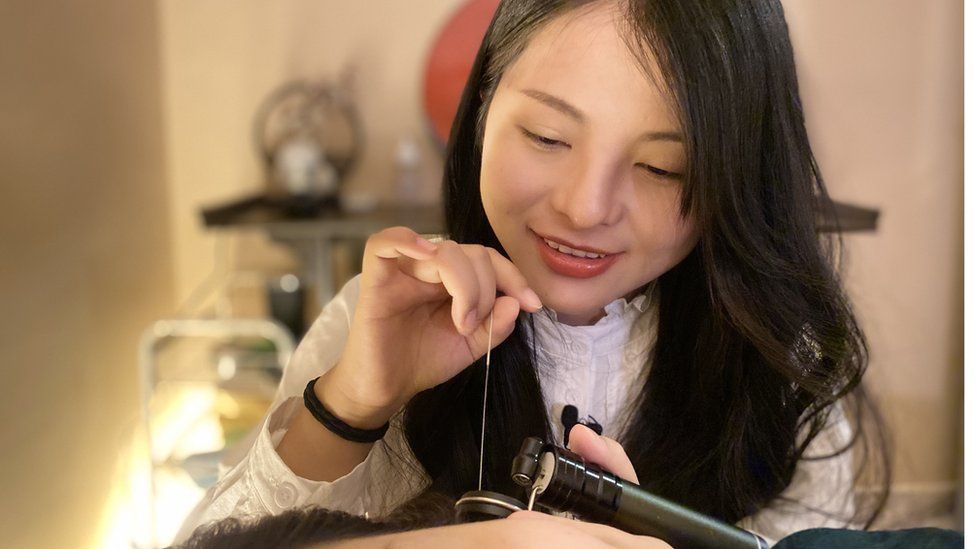
“When I was pregnant, I went to the hospital alone,” she says. “At the time, my shop was struggling to survive and, when I looked around, I did envy the women who went there with their husbands.
“But I chose to become a single mum. I chose to have him, and I needed to get over this.”
Yet it was not only people’s beliefs which made it very hard to become a single parent.
Before 2016, the government effectively prohibited this from happening by stopping officials from issuing birth approval certificates, without seeing proof of marriage for the father and mother.
Another problem had been the requirement for both parents’ ID details to be listed in order for a child to get a hukou – the identity document which all Chinese citizens need to, for example, enrol in school.
When I first came to China two decades ago, I recall unmarried women telling me that they would have no choice but to have an abortion if they became pregnant accidentally because a child could not survive in this country without all the required paperwork.
Even after these rules changed, it remained virtually impossible for most unmarried women to give birth until last year because they could not get access to the health insurance needed to pay for the hospital, or to paid maternity leave.
These two things have now supposedly changed but, in practice, an employer must apply on behalf of a staff member for the benefits to kick in – and some companies are still refusing to do it.
A lawyer working on cases in this field told us she had a client whose boss at a large franchise would not facilitate her getting access to paid maternity leave. Only after she sued the company did they agree to do it.
“It really depends on the openness of the company and the awareness of employers regarding the rights of their staff,” the lawyer said, speaking on condition of anonymity. “However local policies are actually vague and sometimes companies are operating in a grey zone here.”
Some bosses don’t understand that the regulations have changed, the lawyer added.
Others are not keeping their knowledge up to date because they simply don’t want to. They may consider single parenting to be wrong.
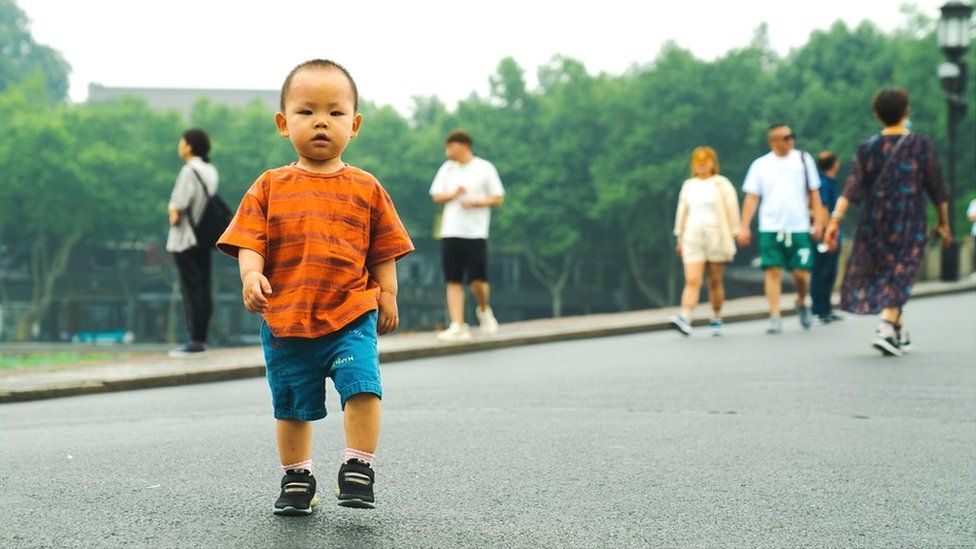
Prof Yang Juhua from Beijing’s Minzu University says that, under Chinese law, all mothers and their children should enjoy the same rights regardless of marital status.
“But, in terms of implementation, it is not smooth,” she says. “Why? Because many people still can’t understand, and are not tolerant towards, single mothers.”
Prof Yang, an expert in demography, says the rules were set up without single mothers in mind.
“China’s regulations are designed for married couples,” she adds. “Marriage is the pre-condition. Single parents are still a new thing here and represent a way of thinking which is very different to our traditional ethical norms”.
One factor driving change for policymakers has been the country’s ageing population.
After decades of the one-child policy, the government would now like young couples to have more babies, but many are not answering the call, for financial reasons. They think they don’t have sufficient funds to raise multiple children.
Under these circumstances, if single women want to have children, those in positions of authority have decided they should be encouraged to.
Visiting a cavernous exhibition centre in the south-eastern city of Hangzhou, we meet Peng Qingqing, among the toys, nappies and mountains of milk formula at a commercial fair focusing on baby products.
Peng Qingqing, who runs an online sales platform, is herself heavily pregnant and unmarried, and, like Zhang Meili, she says that being a businesswoman has made this easier.

“My mum always told me that women should be more independent, confident, and strong,” she tells us. “I don’t want to marry into another family just because of a child”.
The 30-year-old says the time wasn’t right for marriage when she accidentally became pregnant with her much younger boyfriend, but that she wanted to keep her baby.
She says that the shifting status of women in China, especially in terms of their financial independence, has meant that choices can now be made which were not possible just a few years ago.
“Traditionally women relied on men and the family for support. As we earn more, men and women become more equal. Women can even employ people to help them,” she says.
But the vast majority of single women in China are on much lower incomes and remain beholden to the system as it is to support them.
The lawyer who’s been working on cases relating to women’s workplace rights explains that pay during maternity leave is linked to salary. “For grassroots single mothers their incomes are low,” she says. “Without proper, paid, maternity leave they could not survive. It’s a very practical issue.
“These days, the government is encouraging families to have more babies. Some provinces even have financial rewards. But, for single mothers, such support is not available. It’s highly discriminatory.”
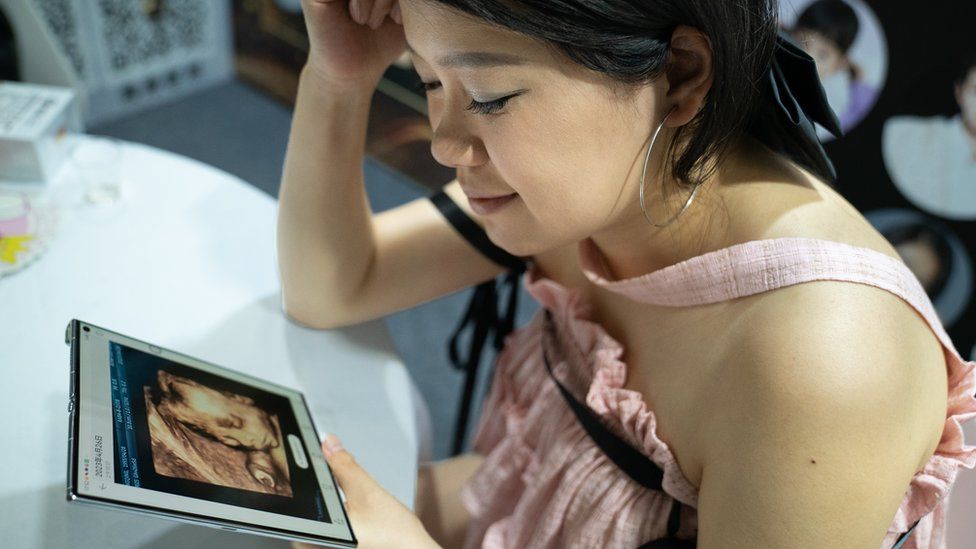
Women who give birth outside of marriage can also face other forms of discrimination, she says.
For those in the public service, they may not be able to get political clearance from the Communist Party (certifying that someone is a decent, loyal citizen). The absence of such official approval can mean missing out on promotions or even not getting a government job in the first place.
But Prof Yang says she thinks that, as society becomes more tolerant towards unmarried mothers, such discrimination will gradually disappear.
If the national government, in the future, requires local officials to more strictly enforce regulations allowing single women to become parents this might also help, she says.
As for Zhang Meili, she says this should be a choice for the women themselves.
I ask her what advice she would give others who find themselves in the same situation as her and she replies: “It depends on their personal situation but, if they love kids, they should have them.
“Don’t lose a child because of other people’s voices or because of questions coming at you from the outside.”
Related Topics
-
-
1 June 2021

-
-
-
25 May 2021
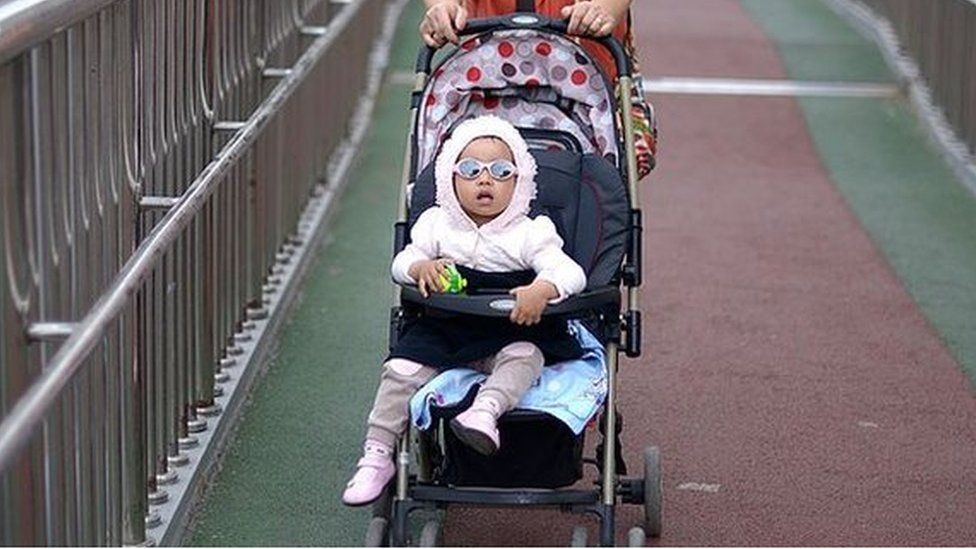
-
Commentary: Oppenheimerâs warning still holds true to this day

Military expenditure in Europe saw its steepest annual increase in at least 30 years. NATO countries and partners are all accelerating towards, or are already past, the 2 per cent of GDP military spending target. The global arms bazaar is busier than ever.
Aside from the opportunity cost represented by these alarming figures, weak international law in crucial areas means current military spending is largely immune to effective regulation.
THE NEW NUCLEAR ARMS RACE
Although the world’s nuclear powers agree “a nuclear war cannot be won and must never be fought”, there are still about 12,500 nuclear warheads on the planet. This number is growing, and the power of those bombs is infinitely greater than the ones dropped on Hiroshima and Nagasaki.
According to the United Nations’ disarmament chief, the risk of nuclear war is greater than at any time since the end of the Cold War. The nine nuclear-armed states (Britain, France, India, Pakistan, North Korea and Israel, as well as the big three) all appear to be modernising their arsenals. Several deployed new nuclear-armed or nuclear-capable weapons systems in 2022.
The US is upgrading its “triad” of ground, air and submarine-launched nukes, while Russia is reportedly working on submarine delivery of “doomsday” nuclear torpedoes capable of causing destructive tidal waves.
While Russia and the US possess about 90 per cent of the world’s nuclear weapons, other countries are expanding quickly. China’s arsenal is projected to grow from 410 warheads in 2023 to maybe 1,000 by the end of this decade.
WeChat: Why does Elon Musk want X to emulate China’s everything-app?
 Reuters
ReutersEarlier this week Elon Musk rebranded Twitter to X – another step in his plan to emulate Chinese mega app WeChat.
Mr Musk has long said that he wants to transform his social media firm, which he bought last year for $44bn (£34.4bn), into a much larger platform.
He has previously praised WeChat – a so-called “everything app” that combines chat, dating, payments and social media – and has said creating something “even close to that with Twitter… would be an immense success”.
In a post on X this week, Mr Musk said that over the coming months, “we will add comprehensive communications and the ability to conduct your entire financial world”.
He will hope that growing X will lead to a jump in revenue – the company has lost almost half its advertising revenue since Mr Musk bought it, and it is struggling under a heavy debt load.
So what is WeChat – and why does Mr Musk want to emulate it?
Launched by technology giant Tencent in 2011, WeChat is now used by almost all of China’s 1.4bn people.
Calling it a super-app is an understatement.
Its services include messaging, voice and video calling, social media, food delivery, mobile payments, games, news and even dating.
It is like WhatsApp, Facebook, Apple Pay, Uber, Amazon, Tinder and a whole lot more rolled into one.
It is so woven into the fabric of Chinese society that it is almost impossible to live there without it.
As you can see from the images below, the interfaces for its various parts are distinct.

It started as a messaging platform like WhatsApp or iMessage, and its two most-used features are the WhatsApp-like “Chats” and “Moments”, which is similar to Facebook.
Its widely-used “Wallet” feature can be linked to debit and credit cards – most shops and online retailers in China accept WeChat payments, with users scanning QR codes to pay. People can also pay household builds, make investments, and even take out loans on WeChat.
Government services are also on WeChat, with users able to check social security information, pay speeding tickets and book hospital appointments.
And during the pandemic, it became an essential: while the whole country was under strict zero-Covid restrictions, it was impossible to move around without a “health code” generated on the app.
But there are several downsides to having so many features on one app.
From a practical point of view, WeChat takes up a large part of a phone’s memory – typically tens of gigabytes of data storage.
More seriously, the huge reach of WeChat into every corner of Chinese life has raised concerns about government censorship, surveillance and other privacy issues.
China blocks access to many foreign websites, from news outlets like the BBC to social media platforms such as Facebook and, ironically, Elon Musk’s X.
This level of state control over the internet also makes it extremely dangerous for people to speak out against the government on WeChat.
It is not unusual for dissenting voices to have their accounts suspended for days or weeks for something they have said in Chats or on Moments.
Even people sharing seemingly uncontroversial information have found themselves on the wrong side of government censors and had their accounts and chat groups shut down.
Kitsch Liao, assistant director of the Atlantic Council’s Global China Hub, says super-apps like WeChat align with Beijing’s aims of organising all aspects of life to keep control of the country.
“Principally to prevent ‘political risk’ – anything that could germinate into an opposition and eventual risk to the CCP’s [Chinese Communist Party’s] rule.”
Will it work in the West?
WeChat’s huge success in China is down to two major factors, Kecheng Fang, at Chinese University of Hong Kong, tells the BBC.
For one, most people in China access WeChat on smartphones, rather than desktop computers, due to the relatively late development of the internet in the country.
“Which means they live in the walled gardens of apps rather than the open web. It is much easier to build an ‘everything app’ on smartphones than on computers,” he says.
Mr Fang also says that China’s lack of competition regulation – which contrasts with most Western countries – allows an app like WeChat to effectively block rival platforms, such as shopping platform Taobao and video app Douyin.
Could Mr Musk make a similar app work outside China? We may be finding out soon – and experts believe it may all depend on digital payments.
Kendra Schaefer, from policy research firm Trivium China, says that Mr Musk has already recognised some of the key elements that have helped make WeChat “critical to daily life” in China, including integrating social media with digital payments.
That could be the “secret sauce of the super-app”, she says.
Edith Yeung, from investment firm Race Capital, points out that a major difference between China and the West is the widespread adoption of digital payment technology.
Most merchants in China do not accept cash or credit cards.
This difference, she says, may be an obstacle to Mr Musk’s ambitions. “It will take the Western world longer to implement a truly cashless or credit card free society,” she says.
Related Topics
-
-
6 October 2022
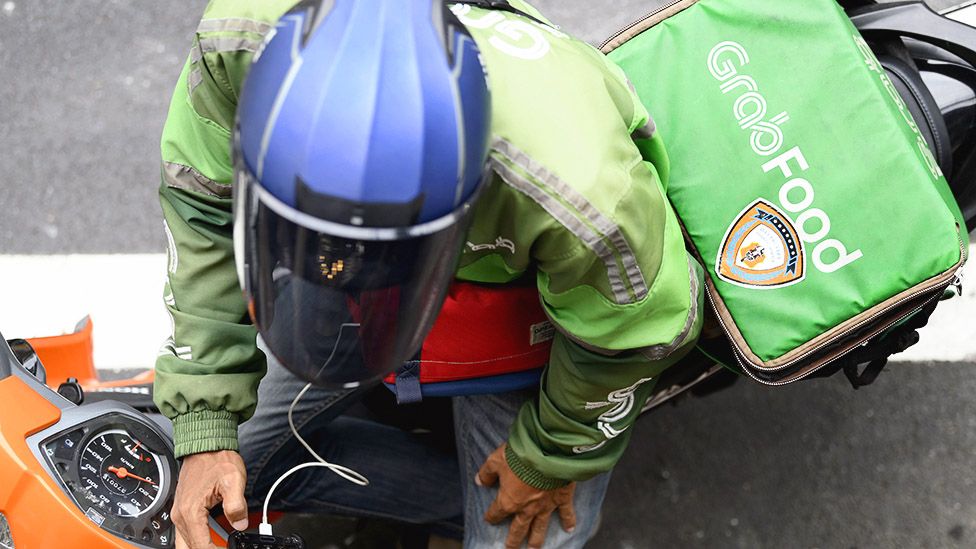
-
-
-
5 October 2022

-
-
-
1 April 2022

-
-
-
5 February 2021
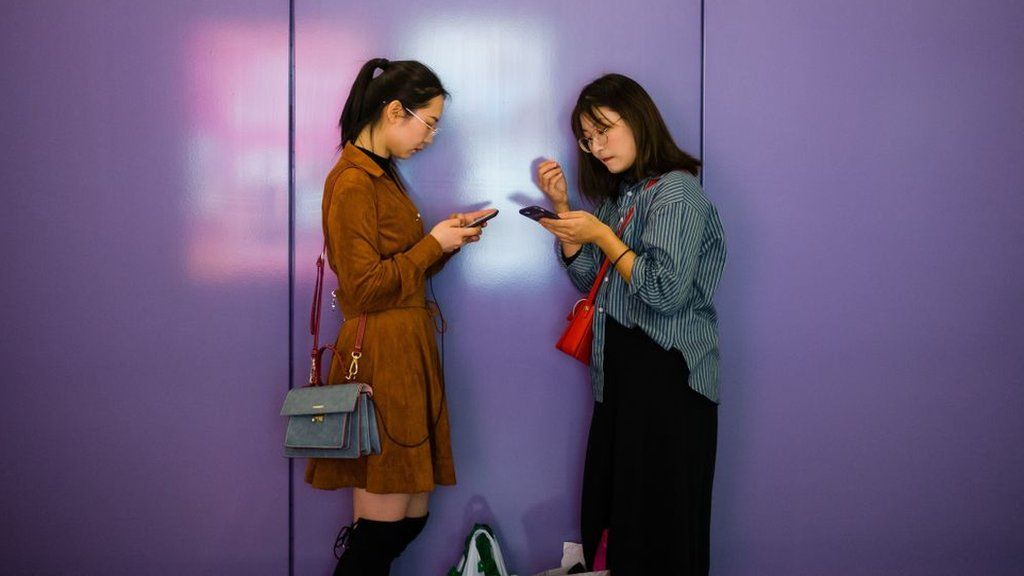
-
-
-
7 June 2019

-
In Malaysiaâs East Coast states, Islamist party expected to see a strong showing in upcoming elections

PAS CONFIDENT IN TERENGGANU
The dynamics in Terengganu differ from Kelantan as it is a swing state that has switched several times between PAS and Barisan Nasional in the past few years.
In the 2018 state elections, PAS won 22 seats while BN won 10 seats.
PN election director Ariffin Deraman is optimistic about their chances to hold on to the state following their big win during the 15th general election.
“We won all eight seats with big majorities, from 16,000 votes to 41,000 in Marang. This is a very big number, never achieved in our history…Until now, there is no sign of a decline in momentum. In fact it is better,” he told CNA.
He said that the “green wave” seen during the last election will continue because of the unity government’s weaknesses and the fact that BN is working with PH.
“We don’t deny UMNO’s strength but when they are working with PH, people won’t support them. Maybe the partnership will work elsewhere, but not in Terengganu,” he said.
After the last general election resulted in a hung parliament, BN became part of the unity government, together with PH, Gabungan Parti Sarawak (GPS), Gabungan Rakyat Sabah (GRS) and Parti Warisan.
Restaurant worker Wan Zihan, 54, who is from Setiu, has previously voted for BN, but has decided not to this time around because its president Ahmad Zahid Hamidi is working with PH and Malaysia’s prime minister Anwar Ibrahim.
“Many UMNO people that I know of are switching their votes to PN. I can vote for UMNO when Zahid is no longer the leader,” he said.
UMNO, the mainstay of Barisan Nasional, will be leading the charge against PAS in both states.
It will be working together with unity government partners Pakatan Harapan (PH), which does not have much support in the east coast.
The opposition is framing its messaging in the state elections by saying there is a need for both the federal and state to be aligned to facilitate more economic development.
UMNO Kelantan communication chief Zawawi Othman told CNA that the state had lagged in terms of development because of PAS’ 33-year rule, with youngsters migrating to other states because of a lack of jobs.
“The people need to realise that there is a need for the state to be aligned with the federal government for progress and development. There is a need for investors to come into the state and create more industries,” he said, adding that PAS could not solve the water woes in the state.
Kelantan PH chairman Muhammad Hussain acknowledged that they would have a huge challenge to defeat PAS, although there could be a new wave of support because of the cooperation between BN and PH.
“It will be a big challenge for PN and they won’t win easily. There is a chance (for us) to add on to the eight seats UMNO won last time,” the former PAS lawmaker told CNA.
He also claimed that the 15th general election could not be used as a yardstick for how the upcoming elections would unfold.
There is expected to be a closer contest in Terengganu, with the state’s UMNO chairman Ahmad Said optimistic that they can win.
“PAS didn’t win (in 2018) because of their strength but because of internal problems in UMNO.
“Terengganu is fragile politically and whatever happens at the federal level will have a big impact on the elections,” said Mr Ahmad Said who is former chief minister of the state.
He pointed out that UMNO lost badly in 1999, winning only four seats but then managed to win the next three elections in 2004, 2008, and 2013 before the state fell back to PAS’ hands in 2018.
“Although there were big issues, we still managed to defend 10 seats (in 2018). Even then, there were mistakes with the choice of candidates. And we lost some seats by marginal majorities. That’s why we are confident of wresting back Terengganu,” he said, claiming that BN has a good track record in the state.
Commentary: Instagram is making you a worse tourist
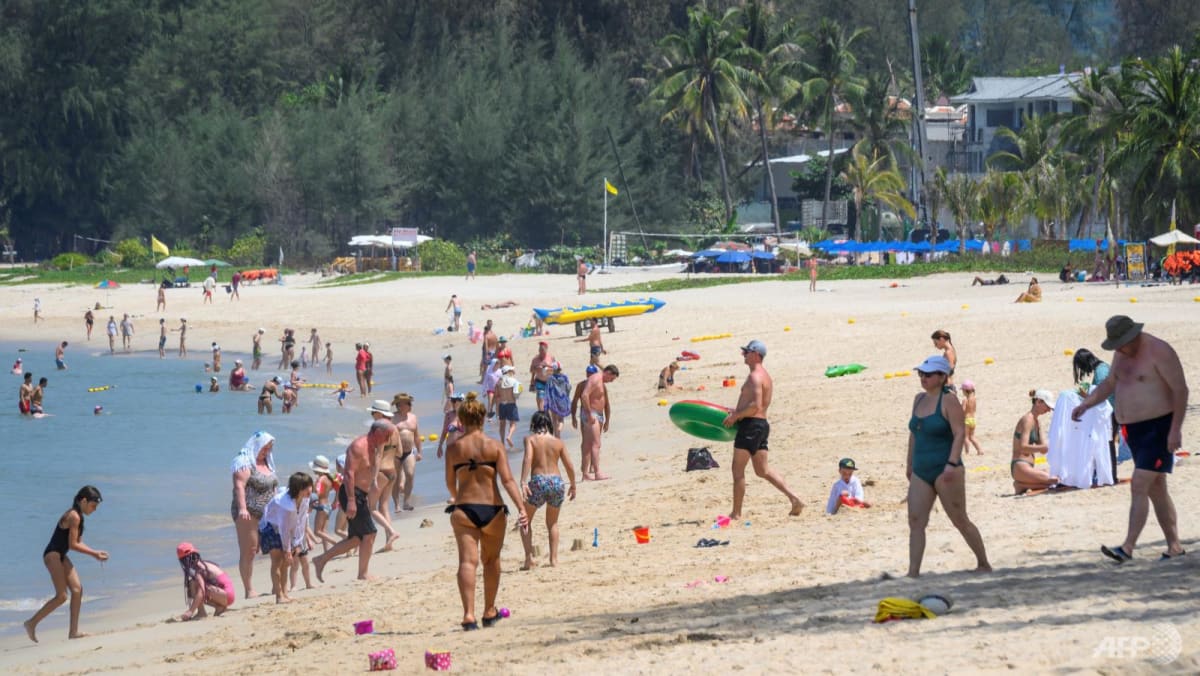
1. Do your research
Even if you’re a seasoned traveller, you may not realise the impact your actions have on local communities. But a bit of information – from your own research or provided by local governments – might be enough to help you act more appropriately. Before you go, look up guidelines or background information on local cultural or safety norms.
Whether you agree with the customs or not is irrelevant. If it is a more conservative place than you are used to, you should be mindful of that – unlike the two influencers who were arrested for explicit behaviour in a temple in Bali.
2. Put down your phone
Research shows that when travelling, people can become alienated from their surroundings if they are more focused on their devices than the destination.
Often the most memorable travel experiences will be when you have a meaningful connection with someone, or learn something new that you’ve never experienced before. That becomes harder if you’re constantly looking at your phone.
3. Use your influence for good
In popular “Instagram versus reality” posts, influencers are revealing the huge crowds and queues behind the most Instagrammable locations.
Showing the less-than-glamorous conditions behind those iconic shots could influence your own social media connections to rethink their personal travel motivations – are they just going somewhere to get the perfect selfie? Having more evidence of these conditions circulating online could lead to a larger societal shift away from social media-induced tourism.
If you have the urge to post, try to promote smaller businesses and make sure you are demonstrating proper (and legal) etiquette on your holiday.
Lauren A Siegel is Lecturer in Tourism & Events, University of Greenwich. This commentary first appeared on The Conversation.
Commentary: Itâs a myth that young people get away with eating anything

Around 30 per cent of women are deficient in at least one important vitamin or mineral, Bibi Chia, principal dietitian at Raffles Diabetes and Endocrine Centre, told CNA.
These impacts aren’t felt immediately but make a tremendous difference as women begin to age. Women in their 20s and 30s may be at the peak of health and feel like they can get away with eating anything. But poor nutrition through the years will lead to low bone and muscle banks, causing health problems to emerge much faster than they might otherwise.
I have seen this first-hand. As a child, I watched my grandmother become frailer as she grew older. At the same time, her meals shifted to soup and porridge – foods widely thought of as more compatible with an elderly digestive system.
What we didn’t know back then, is that soup and porridge were not meeting her nutritional needs as she aged. When she fell sick, she didn’t have muscle reserves to help her recover. She went to the hospital and never came back.
INVESTING IN YOUR HEALTH BANK
The key to ageing well is to invest in building up nutrition reserves early. Our muscle and bone banks start building from childhood through to early adulthood. They then start depleting over time as we age. Complete and balanced nutrition including key nutrients such as protein, calcium and vitamin D are critical to build rich reserves to keep us healthy and improve quality of life as we age.
So how can women ensure their health banks are nice and full? The most basic step is to eat a variety of foods, including protein, fruit, vegetables and dairy. The Asian diet tends to be high in carbohydrates, with hawker centre and food court options offering a lot more rice or noodles than meat, seafood or vegetables.
Simple changes like asking for less rice and adding extra portions of vegetables and meat go a long way. So does eating calcium-rich foods like yoghurt and cheese, and high-protein foods like lean meat, eggs and legumes for muscle health.
In Malaysiaâs East Coast states, PAS expected to see a strong showing in upcoming elections

PAS CONFIDENT IN TERENGGANU
The dynamics in Terengganu differ from Kelantan as it is a swing state that has switched several times between PAS and Barisan Nasional in the past few years.
In the 2018 state elections, PAS won 22 seats while BN won 10 seats.
PN election director Ariffin Deraman is optimistic about their chances to hold on to the state following their big win during the 15th general election.
“We won all eight seats with big majorities, from 16,000 votes to 41,000 in Marang. This is a very big number, never achieved in our history…Until now, there is no sign of a decline in momentum. In fact it is better,” he told CNA.
He said that the “green wave” seen during the last election will continue because of the unity government’s weaknesses and the fact that BN is working with PH.
“We don’t deny UMNO’s strength but when they are working with PH, people won’t support them. Maybe the partnership will work elsewhere, but not in Terengganu,” he said.
After the last general election resulted in a hung parliament, BN became part of the unity government, together with PH, Gabungan Parti Sarawak (GPS), Gabungan Rakyat Sabah (GRS) and Parti Warisan.
Restaurant worker Wan Zihan, 54, who is from Setiu, has previously voted for BN, but has decided not to this time around because its president Ahmad Zahid Hamidi is working with PH and Malaysia’s prime minister Anwar Ibrahim.
“Many UMNO people that I know of are switching their votes to PN. I can vote for UMNO when Zahid is no longer the leader,” he said.
UMNO, the mainstay of Barisan Nasional, will be leading the charge against PAS in both states.
It will be working together with unity government partners Pakatan Harapan (PH), which does not have much support in the east coast.
The opposition is framing its messaging in the state elections by saying there is a need for both the federal and state to be aligned to facilitate more economic development.
UMNO Kelantan communication chief Zawawi Othman told CNA that the state had lagged in terms of development because of PAS’ 33-year rule, with youngsters migrating to other states because of a lack of jobs.
“The people need to realise that there is a need for the state to be aligned with the federal government for progress and development. There is a need for investors to come into the state and create more industries,” he said, adding that PAS could not solve the water woes in the state.
Kelantan PH chairman Muhammad Hussain acknowledged that they would have a huge challenge to defeat PAS, although there could be a new wave of support because of the cooperation between BN and PH.
“It will be a big challenge for PN and they won’t win easily. There is a chance (for us) to add on to the eight seats UMNO won last time,” the former PAS lawmaker told CNA.
He also claimed that the 15th general election could not be used as a yardstick for how the upcoming elections would unfold.
There is expected to be a closer contest in Terengganu, with the state’s UMNO chairman Ahmad Said optimistic that they can win.
“PAS didn’t win (in 2018) because of their strength but because of internal problems in UMNO.
“Terengganu is fragile politically and whatever happens at the federal level will have a big impact on the elections,” said Mr Ahmad Said who is former chief minister of the state.
He pointed out that UMNO lost badly in 1999, winning only four seats but then managed to win the next three elections in 2004, 2008, and 2013 before the state fell back to PAS’ hands in 2018.
“Although there were big issues, we still managed to defend 10 seats (in 2018). Even then, there were mistakes with the choice of candidates. And we lost some seats by marginal majorities. That’s why we are confident of wresting back Terengganu,” he said, claiming that BN has a good track record in the state.
‘Once in a lifetime’: Singapore footballer Zulqarnaen Suzliman on what it’s like facing Spurs

“I KNOW HIS QUALITY”
And it is the mercurial Son who Zulqarnaen goes up against.
He starts the game as right-back, and will have to cope with the 31-year-old Korean’s pace and guile. On corners, Zulqarnaen is tasked with marking Wales full-back Ben Davies.
Son does not see much of the ball early on, and looks to drift wide before cutting in, so Zulqarnaen has to be extra sharp.
“I know his quality, I know his style,” said Zulqarnaen, speaking to CNA after the match. “It was a privilege to play against him.”
As a Spurs penalty appeal is waved away and a player receives treatment, the Singaporean has a chat with Son.
“He was telling me that it was a penalty, (but) I said no!” Zulqarnaen recalled later. “I told him that when I watched him on TV, he looked so small. But in real life, he’s really big. He said: ‘Oh really?'”
Ashton Asoke must reapply for permit
BMA says B6bn condo project won’t be dismantled
PUBLISHED : 30 Jul 2023 at 05:10

The owner of a high-profile Asoke condominium project may resubmit a request for a construction permit with the Bangkok Metropolitan Administration (BMA) provided it has a clear plan to address the entrance problem, Wisanu Subsompon, a deputy Bangkok governor, said yesterday.
His remarks come as Bangkok governor Chadchart Sittipunt is under increasing pressure to act after Thursday’s ruling by the Supreme Administrative Court. It invalidated the construction permit granted to the already finished 6-billion-baht Ashton Asoke condo project in Watthana district following a longstanding legal dispute.
Mr Wisanu said the BMA will now notify the project owner, Ananda MF Asia Asoke Co, Ananda’s joint venture operating the Ashton Asoke project, that the permit for the luxury condo has been revoked under the court’s order. However, he also moved to allay fears among condo residents that the 50-storey high-rise will be dismantled.
The deputy governor said the BMA will allow the project owner time to re-submit their request on the condition that it must have at least one entrance of at least 12 metres wide connected to a public road of 18 metres in width, as per the ruling.
Ashton Asoke’s main entrance joins with Asoke Road.
However, part of the entrance space belongs to the Mass Rapid Transit Authority of Thailand (MRTA) which expropriated the land to build the underground train station entrance right on the project’s doorstep.
The MRTA space cannot be counted as Ashton Asoke’s land which means the requirement for at least one 12-metre-wide entrance cannot be met.
Mr Wisanu said that as Ananda rents the space from the MRTA, it is a legal risk which the project owner has to bear.
Mr Chadchart will talk to the media about the fate of the project on Thursday, according to the deputy governor.
The case was brought to the Central Administrative Court by activist Srisuwan Janya, president of the Stop Global Warming Association, who represents a group of residents from a nearby residential project.
The petitioners asked the court to act against BMA officials, including the Watthana district office, for approving the permit despite knowing about the problem with the entrance width.
Mr Srisuwan said the developer should not use the 580 tenants of the condo to pressure the BMA and the MRTA into shouldering responsibility for the damages incurred as a result of the saga.
MRTA governor Pakapong Sirikantaramas, meanwhile, said the agency has not been contacted by Ananda in the aftermath of the court’s ruling.
However, he maintained the MRTA is not liable for any damages resulting from the court’s decision.
He said the construction had been retroactively revoked, not the MRTA’s permission to allow the use of its space as part of the entrance.
He added it is strictly a dispute involving Ananda and the BMA.

